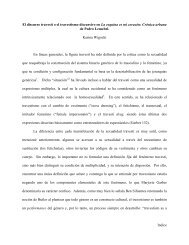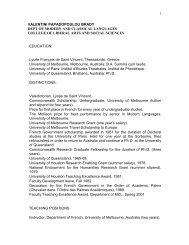Revenge, Justice, and the Law
Revenge, Justice, and the Law
Revenge, Justice, and the Law
Create successful ePaper yourself
Turn your PDF publications into a flip-book with our unique Google optimized e-Paper software.
8 THE WAYNE LAW REVIEW [Vol. 50:4<br />
groups or legally constituted governmental bodies, as motivated by a desire<br />
to seek retribution. 34<br />
B. Legal<br />
Black’s <strong>Law</strong> Dictionary defines <strong>the</strong> term “legal” as “conforming to <strong>the</strong><br />
law; according to law; required or permitted by law...” 35 My use of <strong>the</strong> term<br />
will comport with that definition. Notably absent from that definition is any<br />
judgement as to <strong>the</strong> morality or justice of <strong>the</strong> law. To answer whe<strong>the</strong>r a<br />
particular act is legal, I will simply refer to <strong>the</strong> positive, 36 written law of <strong>the</strong><br />
34. See generally BARTON, supra note 30, at 52-69; NOZICK, supra note 30, at 366-68.<br />
Barton, however, does view revenge as a form of retribution. See BARTON, supra note 30,<br />
at 54 (“While it is true that historically revenge has been <strong>the</strong> most prevalent form of<br />
retribution, it has not been <strong>the</strong> only one.”) (emphasis added). He refers to acts of revenge<br />
taken by <strong>the</strong> victim or those in personal relationship to <strong>the</strong> victim as “personal retribution,”<br />
<strong>and</strong> acts taken by o<strong>the</strong>rs such as vigilante groups or legally constituted governmental bodies<br />
as “non-personal retribution.” Id. at 79. In so doing, he attempts to illustrate <strong>the</strong><br />
commonalities between revenge <strong>and</strong> retribution, (most notably <strong>the</strong> concept of punishment<br />
per se), <strong>and</strong> thus disabuse <strong>the</strong> notion that revenge is an inherently immoral motivation, while<br />
retribution is not. Id. at 56-69. Yet while acknowledging that <strong>the</strong> two terms have such<br />
commonalities, he also stresses <strong>the</strong> intrinsic difference between two; that is <strong>the</strong> sense of<br />
personal involvement which is at <strong>the</strong> very essence of <strong>the</strong> revenge act. Id. at 52-56.<br />
This distinction, however, is not universally accepted, as <strong>the</strong> two terms are often used<br />
synonymously. See, e.g., Furman v. Georgia, 408 U.S. 238, 343 (1972) (Marshall, J.,<br />
concurring) (“Retaliation, vengeance, <strong>and</strong> retribution have been roundly condemned as<br />
intolerable aspirations for a government in a free society.”); JACOBY, supra note 11, at 4<br />
(“The very word ‘revenge’ has pejorative connotations. Advocates of draconian punishment<br />
for crime invariably prefer ‘retribution’—a word that affords <strong>the</strong> comfort of euphemism<br />
although it is virtually synonymous with ‘revenge.’”) (emphasis added).<br />
I believe Barton’s definition to be more precise <strong>and</strong> useful, regardless of whe<strong>the</strong>r he<br />
uses <strong>the</strong> term revenge or personal retribution, because it draws particular attention to <strong>the</strong><br />
personal nature which motivates <strong>the</strong> revenge act. After all, it is that very characteristic—that<br />
it is <strong>the</strong> one who has been victimized who seeks to punish <strong>the</strong> wrong doer—which<br />
constitutes <strong>the</strong> underlying <strong>and</strong> compelling justification for <strong>the</strong> act. Moreover, it is clear that<br />
legal <strong>the</strong>ory itself draws such a distinction, since it accepts retribution, that is public<br />
retribution, as a recognized motivation <strong>and</strong> goal for punishment, while it rejects revenge, or<br />
private retribution as a justification. See infra note 93 <strong>and</strong> accompanying text.<br />
35. BLACK’S LAW DICTIONARY 803 (5th ed. 1979) [hereinafter BLACK’S].<br />
36. Id. at 1046 (“Positive law: <strong>Law</strong> actually <strong>and</strong> specifically enacted or adopted by<br />
proper authority for <strong>the</strong> government of an organized jural society.”).











